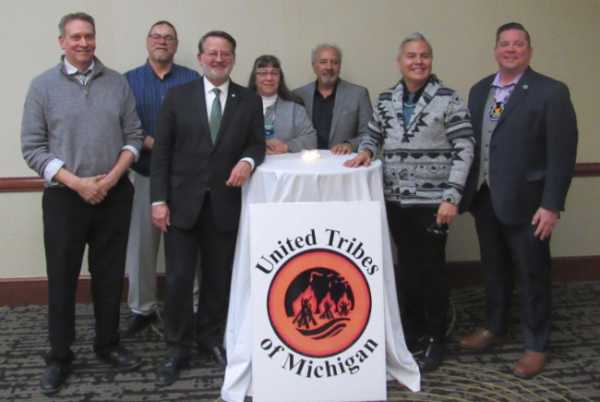
- Details
- By Native News Online Staff
SAULT STE. MARIE, Mich. — The Sault Ste. Marie Tribe of Chippewa Indians, based in Sault Ste. Marie, Mich., is using part of its CARES Act funds to assist its tribal citizens directly. On Monday, July 6, the tribe’s board of directors approved $3.5 million to be used to provide emergency financial assistance to Sault Tribe members through the tribe’s Anishinaabek Community and Family Services.
The funds are intended to help Sault Tribe citizens meet necessary expenses incurred as a result of COVID-19.
“We have worked hard with other tribes and national organizations to secure $8 billion in the CARES Act to benefit tribes impacted by COVID-19. Our Administration and Board are working hard to fashion tribal benefits in accordance with federal statutes and guidelines,” Tribal Chairperson Aaron Payment said, on behalf of the Board of Directors. “Unfortunately, tribes are held to a higher standard than state governments, so determining a spending plan is complex. We are clear, however, that federal guidelines do not permit a per capita distribution."
In accordance with U.S. Department of Treasury guidance, the Sault Tribe’s COVID-19 Direct Tribal Member Assistance Program will only disperse funds to tribal members for expenses such as medical, housing, personal property, food, transportation, funeral and similar direct member needs incurred as a direct result of the coronavirus pandemic.
Every enrolled adult citizen of the Sault Ste. Marie Tribe over the age of 18 and residing in the seven-county service area who has encountered financial hardships related to COVID-19 is eligible to submit the Direct Member Assistance Program Application. Only one grant will be awarded to each tribal citizen's family household. Applicants may be required to provide supporting documentation that details the financial difficulties they have experienced as a result of the coronavirus.
"Our collective goal is to provide relief from the pandemic in accordance with our tribal strategic plan," Payment said. "While our allocation was significant, our service area population for which the funds were based is large. Our priority is to meet the needs of our neediest and most impacted first."
Tribal citizens interested in applying can do so now by emailing [email protected] or by calling:
ACFS toll free number, 1-800-726-0093;
Viola Neadow, Manistique ACFS, 906-341-6993;
Heidi Nesberg, Munising ACFS, 906-387-3906;
Angie Gillmore, St. Ignace ACFS, 906-643-8689;
Megan Miller, Sault Ste. Marie ACFS, 906-632-5250;
Maggie Gaus, Sault Ste. Marie ACFS, 906-632-5250
More Stories Like This
Navajo Resources and Development Committee Issues Notice on Livestock Inspection RequirementsAmerican Prairie, Tribal Coalition Files Protest Over Rescinded Grazing Rights
Northern Cheyenne Push Back Against Trump Administration’s Effort to Alter Little Bighorn History
Florida Man Sentenced for Falsely Selling Imported Jewelry as Pueblo Indian–Made
Navajo Nation Declares State Of Emergency As Winter Storm Threatens Region
Help us defend tribal sovereignty.
At Native News Online, our mission is rooted in telling the stories that strengthen sovereignty and uplift Indigenous voices — not just at year’s end, but every single day.
Because of your generosity last year, we were able to keep our reporters on the ground in tribal communities, at national gatherings and in the halls of Congress — covering the issues that matter most to Indian Country: sovereignty, culture, education, health and economic opportunity.
That support sustained us through a tough year in 2025. Now, as we look to the year ahead, we need your help right now to ensure warrior journalism remains strong — reporting that defends tribal sovereignty, amplifies Native truth, and holds power accountable.
 The stakes couldn't be higher. Your support keeps Native voices heard, Native stories told and Native sovereignty defended.
The stakes couldn't be higher. Your support keeps Native voices heard, Native stories told and Native sovereignty defended.
Stand with Warrior Journalism today.
Levi Rickert (Potawatomi), Editor & Publisher

